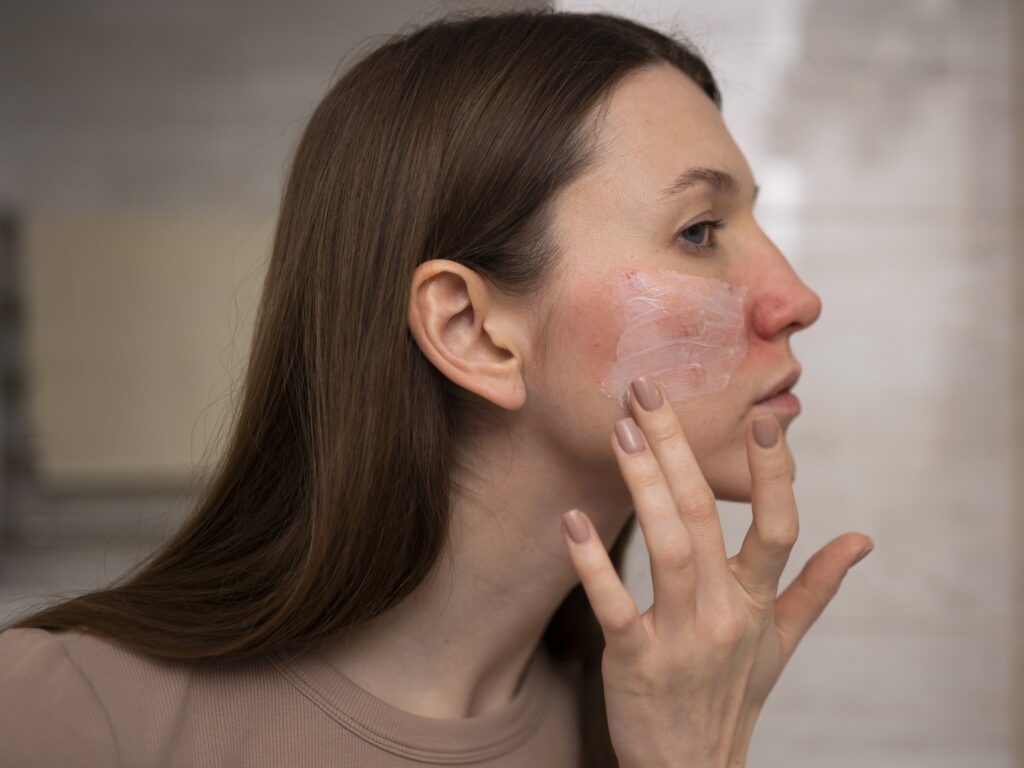Understanding Sensitive Skin
Sensitive skin is a common condition characterized by heightened reactions to various environmental factors, allergens, and irritants. Individuals with this skin type often experience discomfort manifested as redness, itching, burning, or dryness. Understanding sensitive skin is crucial for selecting appropriate skincare products and developing an effective routine tailored to individual needs.
Factors contributing to skin sensitivity vary greatly from person to person. Environmental elements such as extreme temperatures, humidity, and pollution may exacerbate sensitivity, leading to adverse reactions. Additionally, the use of harsh chemicals found in some skincare and cosmetic products can provoke irritation. Common allergens, including fragrances and preservatives, play a significant role in triggering these sensitivities as well. Identifying these triggers is essential for anyone with sensitive skin to maintain its health and comfort.
Moreover, sensitive skin can also be an indicator of underlying skin conditions, such as rosacea, eczema, or dermatitis. Each of these conditions has unique characteristics and must be addressed appropriately. It is vital to recognize that sensitive skin is not a one-size-fits-all issue; variations in sensitivity exist among individuals, influenced by genetic factors, lifestyle choices, and environmental exposure. Therefore, understanding one’s specific skin type and the extent of their sensitivity is paramount for effective skincare.
Implementing a targeted approach begins with a thorough assessment of individual triggers and responses. This knowledge empowers individuals to choose products formulated explicitly for sensitive skin, which often contain soothing ingredients designed to minimize irritation. By recognizing the unique characteristics and common triggers associated with sensitive skin, individuals can better navigate their skincare choices, leading to healthier and more resilient skin over time.
Identifying Personal Needs for Sensitive Skin
Understanding your skin type and levels of sensitivity is essential for developing an effective skincare routine, particularly for those with sensitive skin. Start by observing your skin’s natural characteristics. Sensitive skin often presents signs such as redness, itching, or a burning sensation when exposed to certain products or environmental factors. These reactions can stem from various causes, making it vital to identify your specific skin needs.
Genetics play a significant role in determining your skin’s sensitivity. People with a family history of skin conditions such as eczema, rosacea, or allergies may be predisposed to sensitive skin. Observing family members’ skin responses can provide clues regarding your own skin’s tendencies and needs. Additionally, underlying health conditions such as hormonal imbalances, autoimmune disorders, or skin diseases can affect your skin’s behavior. Consulting with a healthcare professional can offer valuable insights into how these factors may impact your skincare approach.

Lifestyle choices also contribute to skin sensitivity. Factors like diet, hydration, and stress levels can influence how your skin reacts to products. For instance, high sugar intake may lead to inflammation, while proper hydration can improve skin’s elasticity and overall health. Furthermore, environmental aspects such as pollution, extreme weather conditions, and UV exposure can exacerbate sensitivity, highlighting the necessity of adapting your skincare routine to your surroundings.
To assess your skin needs accurately, conduct a patch test when trying new products. This process involves applying a small amount of the product on a discreet skin area and monitoring for adverse reactions over 24 to 48 hours. By taking the time to understand your skin, including its strengths and vulnerabilities, you can choose appropriate products and ingredients that cater to its specific needs, minimizing reactions and enhancing the overall health of your skin.
Choosing Cleansers for Sensitive Skin
When it comes to caring for sensitive skin, the selection of cleansers is crucial. A well-chosen cleanser lays the foundation for any skincare routine, ensuring the skin remains clean without compromising its delicate balance. Sensitive skin often reacts negatively to harsh ingredients and stripping formulations, emphasizing the need for gentle, effective options that maintain the skin’s natural moisture barrier.
Among the various types of cleansers available, gel, cream, foam, and micellar water each offer unique benefits. Gel cleansers tend to be lightweight and refreshing, making them suitable for those with oily or combination skin, while still being gentle enough for sensitive individuals. On the other hand, cream cleansers provide a richer texture that can be highly moisturizing, perfect for parched or dry sensitive skin. Choosing a cream-based option can help soothe irritation while effectively removing dirt and makeup.

Foam cleansers, while often perceived as invigorating, can occasionally contain ingredients that may aggravate sensitive skin. For this reason, it is essential to carefully read labels for alcohols or fragrances, which can lead to irritation. Alternatively, micellar water offers a gentle cleansing method using tiny micelles to attract impurities without the need for rinsing, making it an excellent option for those with particularly reactive skin.
Regardless of the format, always favor cleansers that are labeled as ‘fragrance-free’ and ‘sensitive skin approved.’ Additionally, formulations containing soothing agents such as aloe vera or chamomile can provide extra comfort. It is advisable to opt for moisturizing cleansers that do not strip the skin of its natural oils, as this can prevent dryness and improve overall skin health. By selecting suitable cleansers, individuals with sensitive skin can establish a healthy, effective skincare routine.
Selecting Moisturizers for Sensitive Skin
When selecting moisturizers specifically designed for sensitive skin, it is essential to consider the formulation and ingredients used. Sensitive skin often reacts negatively to certain compounds, making it crucial to choose products that are formulated with care for the skin’s unique needs. Key features to look for in a moisturizer include hypoallergenic and non-comedogenic properties, which help minimize the risk of irritation or breakouts. These characteristics ensure that the product does not contain known allergens or clog pores, allowing for a more soothing application.
One of the most beneficial ingredients for sensitive skin is ceramides. These naturally occurring lipids play an essential role in maintaining the skin barrier, which is particularly important for individuals with sensitive skin. Moisturizers containing ceramides can help retain moisture, restore the skin’s protective barrier, and prevent hydration loss. Choosing a moisturizer enriched with ceramides can significantly improve the skin’s overall resilience and comfort.

In addition to ceramides, formulations that include soothing agents such as aloe vera, chamomile, and calendula are highly recommended for sensitive skin. These ingredients are well-known for their calming properties and can help alleviate redness, irritation, and discomfort. Look for products that are free from potential irritants, such as fragrances, alcohol, and artificial dyes, which can exacerbate sensitivity.
Furthermore, it is wise to choose moisturizers with a lightweight texture that absorb quickly into the skin without leaving a heavy residue. Gel-based or cream formulations that are non-greasy can provide hydration without overwhelming sensitive skin. Testing a small patch of skin before fully integrating a new product into your routine can also be beneficial in identifying products that will work effectively for your specific skin type.
Incorporating Sunscreen into Your Routine
The inclusion of sunscreen in any skincare regimen is vital, particularly for individuals with sensitive skin. Sensitive skin can often react adversely to various environmental factors, making it essential to protect it from harmful ultraviolet (UV) rays. The application of sunscreen not only helps prevent sunburn but also contributes to the long-term health of the skin by minimizing the risk of skin cancer and premature aging.
When choosing sunscreen for sensitive skin, there are two primary categories to consider: physical (or mineral) sunscreens and chemical sunscreens. Physical sunscreens contain active mineral ingredients, such as zinc oxide and titanium dioxide. These ingredients work by sitting on the skin’s surface to reflect and scatter UV rays. They are generally recommended for sensitive skin types, as they are less likely to cause allergic reactions or irritations.

On the other hand, chemical sunscreens absorb UV radiation through their chemical ingredients, such as avobenzone and octisalate. While these formulations can be effective, they may contain preservatives and fragrances that could trigger sensitivities in some individuals. Thus, it is advisable for those with sensitive skin to typically lean towards physical sunscreens for a more gentle approach.
Additionally, selecting a sunscreen with an appropriate Sun Protection Factor (SPF) is crucial. Dermatologists recommend using a broad-spectrum sunscreen with an SPF of at least 30 to ensure adequate protection against both UVA and UVB rays. Moreover, consumers should look for sunblock products that contain skin-friendly ingredients, such as antioxidants and hydrating elements, which can further support skin health. Always remember to perform a patch test before fully incorporating a new sunscreen into your routine to ensure compatibility with your sensitive skin.
Adding Treatment Products Safely
Incorporating treatment products into a skincare routine for sensitive skin requires a carefully measured approach to prevent irritation and adverse reactions. Treatment products such as serums or spot treatments can offer significant benefits; however, they often contain potent ingredients that may not align well with sensitive skin types. Thus, starting slowly is crucial for achieving positive results without discomfort.
When considering products with active ingredients, such as retinoids or alpha hydroxy acids (AHAs), it is essential to introduce them gradually. Begin by using these products only a few times a week rather than daily. This phased approach allows your skin to acclimate to the new ingredients, minimizing the risk of redness or peeling that can accompany sudden changes in skincare. As your skin builds tolerance, you can gradually increase the frequency of use based on your skin’s reaction.

Patch testing is another important step when adding new treatment products to a skincare routine. Before applying a product to your entire face, conduct a patch test on a small area of skin, such as the inside of your wrist or behind your ear. Observe the area for 24 to 48 hours for any signs of irritation, such as redness, itching, or burning. If you experience any adverse reactions, it is best to avoid using that product altogether.
In addition to patch testing, be mindful of the layering of products. Sensitive skin can become easily overwhelmed with multiple active ingredients. It is advisable to limit the number of new products introduced simultaneously to help pinpoint any potential irritants. Furthermore, always consider the formulations of treatment products, opting for those that are fragrance-free and designed specifically for sensitive skin. This will enhance your chances of achieving desired results without compromising skin health.
Establishing a Daily and Weekly Routine
Creating a balanced skincare routine for sensitive skin involves careful consideration of the products used and the frequency of their application. Sensitive skin requires a gentle approach to avoid irritation and maintain its natural barrier. A well-structured daily and weekly regimen can help achieve healthy, vibrant skin while catering to its unique needs.
A daily skincare routine should be succinct and effective, typically encompassing three main steps: cleansing, moisturizing, and sun protection during the day. In the morning, start with a mild, sulfate-free cleanser to remove any impurities from the night. Following cleansing, apply a fragrance-free, hydrating moisturizer designed specifically for sensitive skin, as this will help maintain moisture levels throughout the day. Lastly, the application of a broad-spectrum sunscreen with at least SPF 30 is crucial, as UV exposure can exacerbate sensitivity.

In the evening, it is essential to cleanse again, removing the day’s makeup and environmental pollutants. Opt for a soothing, calming cleanser that aids in reducing inflammation. After cleansing, apply a nourishing night cream formulated for sensitive skin, rich in antioxidants and hydrating ingredients like hyaluronic acid or aloe vera, which can help restore the skin’s calmness overnight.
In addition to the daily routine, incorporating specific weekly treatments can enhance the skincare regimen. Once or twice a week, a gentle exfoliation is beneficial to remove dead skin cells and improve cell turnover. However, it is vital to choose a mild exfoliant, such as a chemical exfoliant with lactic acid or a soft physical scrub, to avoid causing irritation. After exfoliating, applying a calming mask can further soothe sensitivity and nourish the skin, providing hydration and rejuvenation. Remember, moderation is key, as over-treatment can lead to adverse reactions.
By adhering to this structured routine, individuals with sensitive skin can foster a healthy complexion and minimize discomfort.
Adapting Your Routine with Seasonal Changes
The impact of seasonal changes on skin sensitivity is a crucial consideration for anyone with delicate skin. As temperatures fluctuate and humidity levels shift, skin may respond differently, leading to an array of challenges such as dryness, irritation, or increased oiliness. Consequently, adapting your skincare routine as seasons change is essential for maintaining skin health and comfort.
During colder months, lower temperatures and decreased humidity can lead to dry, parched skin. It is advisable to incorporate a richer moisturizer that can provide added hydration and create a protective barrier against harsh environmental conditions. Consider using ointments or creams containing occlusive agents, such as petrolatum or shea butter, which can lock in moisture. Furthermore, limiting exposure to hot showers can prevent stripping the skin’s natural oils, which is especially important for sensitive skin.
In contrast, summer months tend to bring higher humidity and increased temperatures, potentially causing the skin to feel greasy or clogged. At this time, it may be beneficial to switch to lighter, non-comedogenic moisturizers that won’t contribute to breakouts. Products with gel-based formulations often work well during this season, providing hydration without the weight of thicker creams. Additionally, regular exfoliation becomes key to removing dead skin cells and preventing clogged pores, but it is essential to choose gentle exfoliants that cater to sensitive skin.
Transitioning between seasons also offers an excellent opportunity to evaluate your sunscreen choices. As UV exposure increases in spring and summer, it’s crucial to apply a broad-spectrum sunscreen appropriate for sensitive skin. Incorporating products with calming ingredients like aloe vera or zinc oxide can provide skin soothing benefits while ensuring effective sun protection.
Ultimately, the goal is to remain attuned to your skin’s changing needs throughout the year. By observing how your skin reacts to various weather conditions, you can effectively modify your skincare products and practices to maintain optimal skin health and comfort all year round.
Consulting Professionals and Resources
Building an effective skincare routine, especially for those with sensitive skin, often requires expert guidance. Consulting professionals such as dermatologists is pivotal, as they possess the expertise to analyze your skin type and identify specific triggers that may cause irritation or inflammation. Dermatologists can provide tailored recommendations for skincare products, taking into account individual sensitivities and potential allergies. They can also suggest suitable treatments, including topical medications and therapeutic procedures, which can significantly enhance the health of sensitive skin.

In addition to professional consultation, utilizing reputable resources can further aid in developing a comprehensive skincare regimen. A variety of online platforms offer valuable insights into sensitive skin care. Websites such as the American Academy of Dermatology and the National Eczema Association provide extensive information on skin conditions, product recommendations, and tips for managing sensitivity. These platforms are developed by experts in the field and address common concerns faced by individuals with sensitive skin.
Books authored by renowned dermatologists and skincare professionals can also serve as excellent resources. Titles such as “The Sensitive Skin Book” offer in-depth insights and advice for individuals seeking to understand their skin better. Furthermore, joining skincare communities on platforms like Reddit or Facebook can facilitate discussions with others facing similar challenges. These communities often share personal experiences, recommendations, and product reviews, which may prove beneficial in refining your skincare approach.
In summary, while self-education in skincare is valuable, consultations with dermatologists and utilization of trusted resources are crucial for those with sensitive skin. Combining professional insights with ongoing education will empower individuals to create an effective and personalized skincare routine that nurtures their unique skin type.





